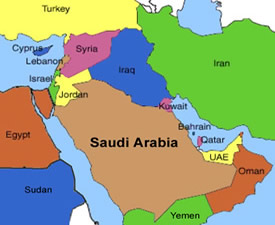| BlueSky Business Aviation News | ||||||||||||||
|
||||||||||||||
Geographically it is the fifth-largest state in Asia and second-largest state in the Arab world after Algeria. Saudi Arabia is bordered by Jordan and Iraq to the north, Kuwait to the northeast, Qatar, Bahrain, and the United Arab Emirates to the east, Oman to the southeast, and Yemen to the south. The Kingdom owns huge oil and gas reserves, making it one of the largest oil producers in the world.
All of this very much justifies the huge business aviation traffic towards Saudi Arabia, and the large number of business jets owned by Saudi families and companies. This article will brief the business aviation community about the regulatory, ground services and concierge aspects of operating business aviation flights to Saudi Arabia. Landing Permit Securing a landing permit is required for all type of operations into Saudi Arabia. The General Authority of Civil Aviation (GACA), whose headquarters is based in the city of Jeddah, is the authority responsible for processing and approving the permit application, which must be submitted on GACA online portal. The application for the permit must include all the information and documents relating to the operator, aircraft and the flights. Additionally, the receiving party of the flight must issue a sponsorship letter addressed to GACA explaining the purpose of the flight, and confirming the responsibility for it, and mentioning his contact information. He must also be prepared to receive a call from GACA to confirm the letter. Saudi Arabia CAA (GACA) imposes a permit fee for the issuance of the overflight and landing permit, a fee which is paid in exchange for the processing of the permit application, and which is different from the overflying navigation fees. While the lead time for the processing of permits is 72 hours, GACA may issue the permit in less time if applied through a recognized registered agent which is experienced in the permit application process and who is capable of ensuring the application is complete and includes all the required information and documents required for the permit approval from the first time. Overflight permit is also required for all type of flights overflying the Saudi territory as well. Main Airports Jeddah (JED / OEJN), Riyadh (RUH / OERK), Dammam (DMM, OEDF) and Medina Mohammad Bin Abdulaziz International Airport (MED / OEMA) are the main international airports of Saudi Arabia. They are all airports of entry and are open day and night. TIF airport is also an international airport in Saudi Arabia. The country also has another 22 airports; 10 of them are considered regional airports, from which international flights are operated by regional airlines so they are airports of entry, and 12 domestic airports. OEJN, OEMA and OERK have special private aviation terminals for business aviation operations, while OEDF has only executive lounges. Whilst the airports of Saudi Arabia are not usually slot coordinated, operations during the Hajj season requires a special slot from the airport authority before approving the landing permit.
Ground Handling Services For many years, Saudia Ground Services (SGS), a wholly-owned subsidiary of Saudia Airlines (The National Carrier of the Kingdom of Saudi Arabia), has been the only provider of ground handling services for passenger flights in all airports in Saudi Arabia, while Saudia Cargo was the ground handling provider of cargo flights. Swissport was granted a second license to provide passenger and cargo ground handling services in Jeddah OEJN recently too. As for business aviation handling services, there are multiple providers of services in the main airports of Saudi Arabia. Arabasco, Jet Aviation and Saudia Airlines subsidiary Saudi Private Aviation (SPA) are the main business aviation handlers in Jeddah OEJN and Medina OEMA, and they are also the business aviation handlers in Riyadh OERK in addition to NAS Execujet, a joint venture between NASJET and Execujet Aviation Group. All of these handlers have their own lounges in the general aviation terminals in OEJN, OEMA and OERK. In the other airports of Saudi Arabia, Saudi Private Aviation (SPA) is the main business aviation handler; although there are no general aviation terminals in the other airports, there are executive lounges that can be used in exchange for a fee. Aviation Fuel Whilst Saudi Aramco is the main oil refinery in Saudi Arabia, there are many into-plane jet fuel suppliers in the airports of Saudi Arabia. The Sudanese-owned company Bakri Energy provides fuel in OERK and OEJN, while the Modern Consortium for Refueling Aircraft Co. Ltd (MCRA) provides fuel in OEDF. UGAFCO, which is a subsidiary of the UAE group ENOC, also provides fuel in OERK and OEJN. The Arabian Petroleum Supply Co (APSCO) provides aviation fuel in all the regional and domestic airports of Saudi Arabia. Shell also supplies fuel in the airports of Saudi Arabia. Fuel price in Saudi Arabia is considered competitive compared to other parts of the world, and it changes monthly based on the ARAMCO refinery price change. Fuel prices are different from one supplier to another. Fuel cards and credit cards are not accepted by all the suppliers in Saudi Arabia.
Passenger and Crew Visas The passengers must secure their visas from the Saudi Consulate in their country of origin or residence before the trip to Saudi Arabia, unless they are holding the nationality of the countries exempted from the visa requirement in Saudi Arabia, such as citizens of the Gulf Cooperation Council (GCC). As for the crew, they can secure their visa upon their arrival to the Saudi Airports on General Declaration, though this visa is valid only for 72 hours. Overstay in Saudi Arabia may subject the crew to a penalty from the immigration authority. As such, if the flight is intended to stay in Saudi Arabia for more than 72 hours, the crew must secure their visa from the Saudi consulate before their arrival into Saudi Arabia, as the visa upon arrival can only be extended for another 72 hours in rare cases, requiring valid reasons justifying the extension, and this extension requires the involvement of the local sponsor. If the flight is urgent and the crew has no time to secure the visas in advance, the best practice is to fly the passenger to Saudi Arabia and then position the flight to Egypt if landing in OEJN Jeddah, Dubai if landing in OERK Riyadh, and Bahrain if landing in OEDF Dammam. Special Restrictions Operating to Saudi Arabia requires some special considerations that business aviation operators normally are not concerned about when flying to other countries. These include: Alcohol. As alcohol consumption is prohibited in Saudi Arabia, there are special regulations from the customs authority in relation to the business aircraft arriving with alcohol on board. Non-compliance will subject the aircraft operator to fines. All bars on board the aircraft must be closed, locked and sealed prior to the aircraft landing in Saudi Arabia. When the aircraft is operating from a Saudi international airport to any Saudi domestic airport, bars will be offloaded by the customs and will be under their custody until the next departure of the aircraft internationally. Female Crew. With regards to female crew, they must be wearing conservative clothes, and have scarves to cover their hair in case they leave the aircraft. Cabotage. While foreign aircraft operators can fly to Saudi Arabia and pick up Saudi or local passengers to fly them internationally, they are not allowed to pick up passengers in Saudi Arabia and fly them domestically, similar to many other countries. However, there are no restrictions on foreign operators making multiple stops in the Saudi airports as long as there are no new passengers joining the flight. Concierge Services Due to the religious and economic status of Saudi Arabia, the country is prepared to receive huge amounts of visitors every year, and accordingly has a large number of hotel rooms from all classes, including most of the major international hotel chains. Itís extremely hard to secure a proper chauffeured transportation during the Hajj season and the days of the Holy month of Ramadan (when huge number of Muslims visit Saudi Arabia for Umrah). Therefore, itís highly recommended that you work with your international trip planning provider in advance to reserve your transportation. All aircraft operators aim to have a share in the Saudi business aviation market, and they are right. Being equipped and prepared with a complete understanding of the operations regulatory and service environment ensures that your flight is destined to experience success. Dr. Adnan Branbo is the Chief Executive Officer of iJET, a flight support service provider based in Malta and Dubai. iJET services include over-flight and landing permits, credit ground support arrangements, and highly competitive aviation fuel. iJET network covers the world, through alliances and relationships with local agents and major suppliers around the world. Adnan can be reached at: adnan@ijet.aero Also in this series: Algeria | Angola | Jordan | Kuwait | Malta | Mauritius | Nigeria | Oman | Qatar | South Korea | Sri Lanka | UAE | Saudia Arabia
|
||||||||||||||




